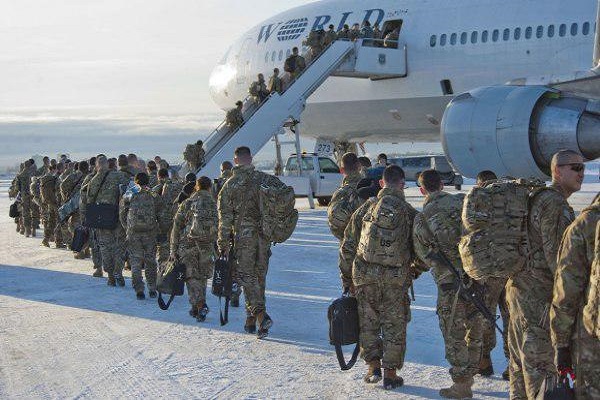Top U.S. commanders believe they have tentative White House approval to leave just over 4,000 U.S. troops in Afghanistan beyond November, delaying a full American pullout until after the presidential election.
The plan, worked out at a meeting between Pentagon and White House officials late last month, would represent an about-face for President Trump. He has pushed for a complete withdrawal of the 8,600 troops now in Afghanistan by the election, seeing a pullout as a much-needed foreign policy achievement as his reelection prospects have deteriorated.
Trump had only recently told advisors that a full and rapid pullout could blunt the controversy over intelligence reports that Russia has paid militants to kill American service members, one official said. The president, who has made clear that he cares little about conditions in Afghanistan, could still order a full withdrawal by November if he decides it would help him in the election, officials said.
But Pentagon officials warned that a complete withdrawal over the next five months could plunge Afghanistan into crisis, dooming peace talks U.S. officials have been seeking to jump-start between the Afghan government and Taliban militants and worsening already surging violence. Officials also warned the White House that getting out completely by November would force them to leave substantial amounts of equipment behind.
“The timetable is being driven by the election clock, not the Afghan clock,” said one official, who requested anonymity in discussing
the administration’s thinking.
Other administration officials also believe that a sooner-than-planned exit would only worsen the perception that the U.S. and Trump were being driven out of the country after nearly two decades of war.
Marine Gen. Kenneth F. McKenzie Jr., the top commander in the Middle East, said last month that he could not recommend a full withdrawal of American troops from Afghanistan until the Taliban demonstrates it no longer supports Al Qaeda forces there.
“If conditions would allow, we’re prepared to go to zero” by May, McKenzie said in a videoconference hosted by the Washington-based think tank Middle East Institute. “If asked my opinion, those conditions have not been fully met.”
It wouldn’t be the first time that the Pentagon had successfully lobbied a president to halt a planned withdrawal from Afghanistan months before an election. President Obama also halted plans for a complete pullout in 2015, leaving to his successor the question of whether the U.S. should depart.
If Trump loses the election, the decision on a final withdrawal would fall to Joe Biden, the presumptive Democratic nominee, who has long favored reducing the U.S. presence in the country.
The president recently revived his talk of a complete withdrawal before the election, amid the public furor over the reports that he was informed this year about the Russian bounties and has done nothing in response.
Trump has denounced the report of Russian bounties as a “hoax” and claimed that intelligence officials never told him verbally about the payments. The bounties were mentioned, however, in intelligence summaries provided to him and other top advisors at the White House. A Taliban spokesman has denied the reports.
U.S. military commanders and intelligence officials say there is strong evidence that Russia paid bounties to the Taliban, and they have been investigating whether payments were made after three Marines were killed last year by a car bomb near Bagram Airfield, north of Kabul, officials said.
The U.S. troop level in Afghanistan has already fallen steeply, to 8,600 last month from 12,000 as recently as January. The initial drawdown was part of a Feb. 29 agreement between the Trump administration and Taliban militants that calls for a complete American exit by next spring.
Trump wanted to expedite that even as U.S. officials insist that further withdrawals are contingent on the Taliban denying sanctuary to Al Qaeda within Afghan territory under its control and on the power-sharing negotiations with the Afghan government. Neither condition has been achieved.
The planned talks have been delayed by jockeying between Kabul and Taliban officials over the release of prisoners. And a Pentagon report released Wednesday concludes that Al Qaeda operatives still “routinely” work with “low-level Taliban members” and maintain “an enduring interest in attacking U.S. forces.”
Also, attacks by Taliban fighters against Afghan troops have soared since the signing of the U.S.-Taliban deal. The agreement barred Taliban attacks on U.S. troops but left out similar protections for Afghan government forces, whose casualties have reached levels unseen for a decade.
Afghan government officials say more than 400 Taliban attacks this year have claimed the lives of some 200 members of the Afghan security forces. Separately, 42 civilians — including babies in a hospital maternity ward — were killed in a single week, although other Islamic militants were blamed.
Trump’s insistence on pulling out all U.S. troops has drawn opposition not only from the Pentagon but also from lawmakers of both parties.
The House Armed Services Committee on Wednesday moved to restrict his ability to order steeper withdrawals, approving a provision that would block funding for reductions below 8,000 troops unless the administration certifies that doing so would not compromise counter-terrorism goals and other conditions. The amendment, attached to an annual defense bill, was approved by a vote of 45 to 11.
Rep. Liz Cheney of Wyoming, a member of the House Republican leadership, said the provision “lays out, in a very responsible level of specificity, what is going to be required if we are going to in fact make decisions about troop levels based on conditions on the ground and based on what’s required for our own security, not based on political timelines.”
U.S. diplomats have consulted numerous times with Taliban and Afghan government leaders, with the goal of pushing the sides toward enacting the Feb. 29 agreement. But they have made little progress.
“Giving the process a short shrift will undermine our interests and our international reputation,” Earl Anthony Wayne, a former senior U.S. diplomat in Afghanistan, told The Times. “We would pay serious costs in the short, medium and long term for a precipitous departure this year.”
Secretary of State Michael R. Pompeo on Wednesday declined in a news conference to confirm or deny reports that Russia has paid the Taliban to kill U.S. troops, but warned the Taliban against attacks. The administration is constantly issuing warnings to Russia, he said, despite Trump’s outward affinity for Russian President Vladimir Putin.
“When we see credible information that suggests that the Russians are putting American lives at risk, we’re responding in a way that is serious,” he said. “Do we warn them? Do we talk to them? … The answer is, of course we do.”
In a videoconference Monday night with the Taliban’s chief negotiator, Abdul Ghani Baradar, Pompeo had reiterated that “the expectation for the Taliban [is] to live up to their commitments, which include not attacking Americans.”
Pompeo insisted that the United States was continuing to press Taliban leaders to cut ties with Al Qaeda. “I think we will be able to see when we get to that point,” Pompeo said Wednesday on Fox News.
Asked whether U.S. troops will be in Afghanistan on election day, Nov. 3, he said, “The president will ultimately make that decision.”













